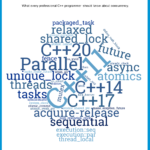C++ Core Guidelines: Naming and Layout Rules
The C++ core guidelines have about twenty naming and layout rules. A few of them are obvious; a few of them may be controversial. Let’s see what I mean.

Naming and Layout Rules
First of all, consistency is more important than these naming and layout rules. With this in mind, here is an overview of the rules.
- NL.1: Don’t say in comments what can be clearly stated in the code
- NL.2: State intent in comments
- NL.3: Keep comments crisp
- NL.4: Maintain a consistent indentation style
- NL.5: Don’t encode type information in names
- NL.7: Make the length of a name roughly proportional to the length of its scope
- NL.8: Use a consistent naming style
- NL.9: Use ALL_CAPS for macro names only
- NL.10: Avoid CamelCase
- NL.11: Make literals readable
- NL.15: Use spaces sparingly
- NL.16: Use a conventional class member declaration order
- NL.17: Use K&R-derived layout
- NL.18: Use C++-style declarator layout
- NL.19: Avoid names that are easily misread
- NL.20: Don’t place two statements on the same line
- NL.21: Declare one name (only) per declaration
- NL.25: Don’t use void as an argument type
- NL.26: Use conventional const notation
I will not write about the naming and layout rules of the C++ core guidelines, which already have sufficient explanations. I only write about the rules, which need additional wording or are often discussed in my seminars.
NL.1: Don’t say in comments what can be clearly stated in the code
I’m not a friend of commenting on each piece of code. Commenting on each piece of code may be a code smell because you code it too sophisticated. I’m more with the Python rule: explicit is better than implicit. I only write a comment if I have to apply a trick that is not apparent. For example, young professionals tend to remove curly braces from their code, such as you would remove redundant round braces from an arithmetic expression. If you don’t believe me, visit my seminars. But curly braces are essential to scope RAII objects such as locks or smart pointers. Removing a curly brace from a lock may give you a slower program or a deadlock. In the end, many of my customers comment on using curly braces.
std::mutex mut; { // necessary to manage the lifetime of the lock std::lock_guard<std::mutex> lock(mut); ... }
What is terrible about comments is that they become out of date. By definition, this is not possible for the source code. It’s always up to date. As a freshman, my job was quite often to refactor legacy code. I often had no clue what it does, and I was pretty frustrated. To my rescue, I found a few comments. But the comments were completely outdated. It took me a while to recognize this; you can’t imagine how I felt. Comments have to be maintained as code but are often very sloppy maintained.
NL.5: Don’t encode type information in names
Really? I thought since the last millennium, we were done with Hungarian Notation. I mean these good old times in which our variables had no type. Hungarian Notation is redundant with the type-checking of the compiler, contradicts generic programming, and – this is my main argument – becomes outdated as comments become outdated. Can you guess for what the following variable names stand?
 Modernes C++ Mentoring
Modernes C++ Mentoring
Do you want to stay informed: Subscribe.
bBusy; fBusy; pFoo; szLastName; fnFunction; pszOwner; rgfpBalances; lpszBar; g_nWhells; m_whells; _whells;
If you don’t know, here is the solution: Hungarian Notation.
NL.7: Make the length of a name roughly proportional to the length of its scope
This rule sounds strange, but we are already used to it. Giving a variable the name i or j or the name T will immediately make the code’s intention clear: i and j are indices, and T is a template type parameter.
template<typename T> void print(ostream& os, const vector<T>& v) { for (int i = 0; i < v.size(); ++i) os << v[i] << '\n'; }
There is a meta-rule behind this rule. A name should be self-explanatory. In a short context, you get what the variable means with a glance. This self-evidence will not automatically hold for more extended contexts; therefore, you should use longer names.
NL.16: Use a conventional class member declaration order
Okay, this is an easy but quite helpful rule.
- When you declare a class, use the following order: constructors, assignments, destructor before functions, and data.
- The same goes for public, protected, and private: Use the
publicbeforeprotectedbeforeprivateorder. - Don’t use the access specifiers in a class more than once:
class X { // bad public: void f(); public: int g(); // ... };
NL.19: Avoid names that are easily misread
Can you read this example without any hesitation?
if (readable(i1 + l1 + ol + o1 + o0 + ol + o1 + I0 + l0)) surprise();
Honestly, I often have issues when I type in a password having the number 0 or the significant capital O. Two years ago; it took me quite a time to log into a server. The automatically generated password had a character O.
NL.20: Don’t place two statements on the same line
Let me give you two examples. Did you spot the two issues?
char* p, p2; char a = 'a'; p = &a; p2 = a; // (1) int a = 7, b = 9, c, d = 10, e = 3; // (2)
p2 is a char (1), and c is not initialized (2).
With C++17, we got an exception to this rule: structured binding. Structured binding allows me to declare more than one name in one declaration (line 1).
Now, I can write the if statement with an initializer that is cleaner and more readable.
std::map<int,std::string> myMap; if (auto [iter, succeeded] = myMap.insert(value); succedded){ // (1) useResult(iter); // ... } else{ // ... } // iter and succeeded are automatically destroyed
What’s next?
DONE! After over one hundred posts on the C++ core guidelines, I have two good pieces of news for you.
First, I write a book about the C++ core guidelines, in which I try my best to make a readable and concise story out of this precious content. My idea is to base my story on C++17 and the C++ core guidelines rules, which are essential to writing modern C++. Of course, modern C++ means, in particular, writing type-safe, bounds safe, and lifetime safe C++ code. So, stay tuned; I will start in the next few days and give you an update if appropriate.
Second, my blog will shift to the hot topic in C++: the upcoming C++20 standard. My posts start in a breadth-first search and will end in a depth-first search. C++20 is presumably as powerful as C++11. You can, therefore, assume that I have a lot to write.
Thanks a lot to my Patreon Supporters: Matt Braun, Roman Postanciuc, Tobias Zindl, G Prvulovic, Reinhold Dröge, Abernitzke, Frank Grimm, Sakib, Broeserl, António Pina, Sergey Agafyin, Андрей Бурмистров, Jake, GS, Lawton Shoemake, Jozo Leko, John Breland, Venkat Nandam, Jose Francisco, Douglas Tinkham, Kuchlong Kuchlong, Robert Blanch, Truels Wissneth, Mario Luoni, Friedrich Huber, lennonli, Pramod Tikare Muralidhara, Peter Ware, Daniel Hufschläger, Alessandro Pezzato, Bob Perry, Satish Vangipuram, Andi Ireland, Richard Ohnemus, Michael Dunsky, Leo Goodstadt, John Wiederhirn, Yacob Cohen-Arazi, Florian Tischler, Robin Furness, Michael Young, Holger Detering, Bernd Mühlhaus, Stephen Kelley, Kyle Dean, Tusar Palauri, Juan Dent, George Liao, Daniel Ceperley, Jon T Hess, Stephen Totten, Wolfgang Fütterer, Matthias Grün, Ben Atakora, Ann Shatoff, Rob North, Bhavith C Achar, Marco Parri Empoli, Philipp Lenk, Charles-Jianye Chen, Keith Jeffery, Matt Godbolt, Honey Sukesan, bruce_lee_wayne, Silviu Ardelean, schnapper79, Seeker, and Sundareswaran Senthilvel.
Thanks, in particular, to Jon Hess, Lakshman, Christian Wittenhorst, Sherhy Pyton, Dendi Suhubdy, Sudhakar Belagurusamy, Richard Sargeant, Rusty Fleming, John Nebel, Mipko, Alicja Kaminska, Slavko Radman, and David Poole.
| My special thanks to Embarcadero |  |
| My special thanks to PVS-Studio |  |
| My special thanks to Tipi.build |  |
| My special thanks to Take Up Code |  |
| My special thanks to SHAVEDYAKS |  |
Modernes C++ GmbH
Modernes C++ Mentoring (English)
Rainer Grimm
Yalovastraße 20
72108 Rottenburg
Mail: schulung@ModernesCpp.de
Mentoring: www.ModernesCpp.org




Leave a Reply
Want to join the discussion?Feel free to contribute!